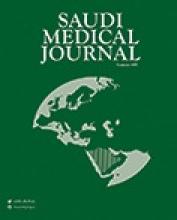Abstract
Objectives: To identify the sociodemographic and clinical predictors of uncontrolled diabetic patients, to identify high-risk and people with impaired glycemic control, to establish more effective strategies for reducing morbidity and mortality.
Methods: This case-control study of 8209 enrolled patients were included from the diabetes registry by Chronic Illness Center (CIC), Family and Community Medicin, Prince Sultan Military Medical City, Riyadh Saudi Arabia between February 2019 and February 2020. Cases are defined as patients with type II refractory diabetes having persistent HbA1c >9, not reach adequate glycemic control despite intensified therapy under specialist care (CIC) for at least 6 months. Controls were defined as patients with Hba1c ≤9. Multivariable regression analysis was used to identify predictors for patients with the persistent outcome of HbA1c >9%.
Results: Overall, a total of 1152 cases and 4555 controls were included. Patients with refractory diabetes were younger (mean: 58.5, standard deviation [SD]: 11.7) and females (63.4%). Duration of diabetes (13.3, SD: 7.4, p<0.001) and the mean value of low-density lipoprotein (LDL) (2.7, SD: 0.91, p<0.001) were significantly higher in the refractory group. The findings from the final model revealed that with every unit increase in age (odds ratio [OR]: 0.97, [95% confidence interval [CI]: 0.96-0.98]) and body mass index the odds of having refractory diabetes significantly reduced by 0.97 times (OR: 0.97, [95% CI: 0.95-0.99]). While with every unit increase in the duration of diabetes (OR: 1.03, [95% CI: 1.01-1.05]), systolic blood pressure (OR: 1.01, [95% CI: 1.00-1.02]) and LDL (OR: 1.42, [95% CI: 1.23-.62]) the odds of having refractory diabetes significantly increased by 1.03 and 1.42 times respectively compared to controls when adjusted for gender, albumin creatinine, diastolic blood pressure.
Conclusion: The findings from this study helped classify the predictors of refractory patients with diabetes. Understanding refractory patients’ predictors may help to develop new therapeutic strategies to boost their glycemic status safely.
Footnotes
Disclosure. Authors have no conflict of interests, and the work was not supported or funded by any drug company.
- Received December 6, 2020.
- Accepted December 30, 2020.
- Copyright: © Saudi Medical Journal
This is an open-access article distributed under the terms of the Creative Commons Attribution-Noncommercial License (CC BY-NC), which permits unrestricted use, distribution, and reproduction in any medium, provided the original work is properly cited.






